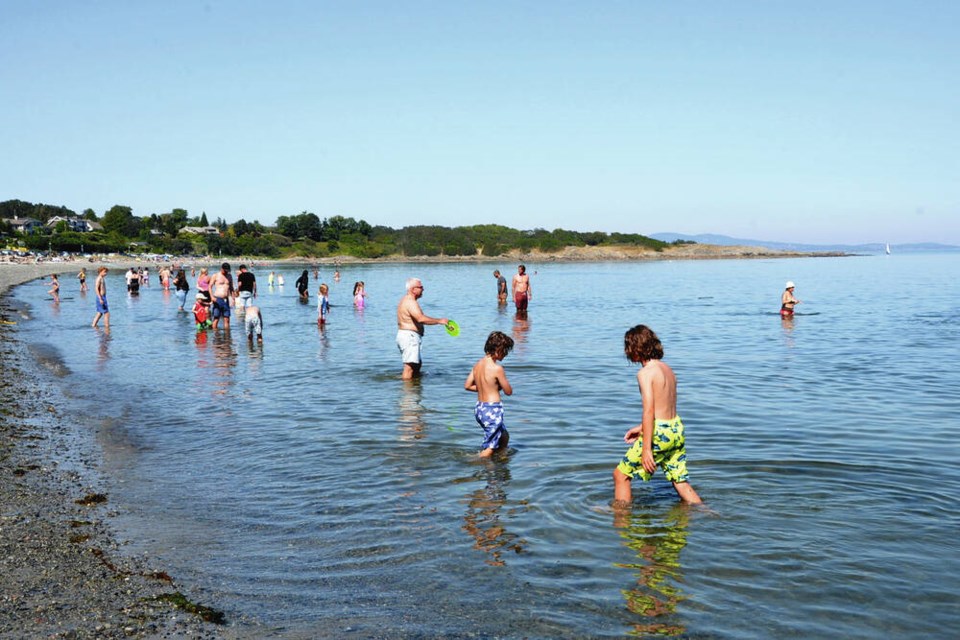As I prepare to enter the ocean off of Dallas Road, I have to admit that it isn’t the cold that scares me. It isn’t even the painful reaction the body has to cold temperatures or the rolling waves that threaten to knock me in before I’m ready.
What I fear is that the moment I emerge, I will be gasping for air — possibly shrieking — scaring sunbathers and small children on the shore.
This is my attempt at cold water swimming, and while some, more experienced cold water swimmers make this look easy in far colder water and during far colder months, I have no doubt that “graceful” would be the last word used to describe what I am about to do.
No matter how long I attempt to prepare my body and mind, when I finally make the decision to submerge, the relentlessly cold Salish Sea knocks the air from my lungs and the only thought in my mind is “Must. Exit.”
I don’t shriek — but (of course) another wave promptly knocks me down on my journey to shore.
Winter swimming has long been popular in more northern climes, but in recent years, cold water dunks have gone mainstream in North America, with many touting the health benefits of being enveloped by water colder than 5 C.
In Victoria, you have to go farther than Dallas Road to find water that cold — especially in July, when sea water temperatures average 11.2 C. Even in January, the ocean temperature typically hovers around 6 to 8 C.
But that doesn’t mean there aren’t benefits if you do it right. And it definitely doesn’t mean the water feels warm.
A 2020 study published in the National Library of Medicine referenced health benefits to mental health, blood pressure and the immune and cardiovascular systems, but also noted that those unfamiliar and not acclimatized to the water are at risk of shock, hypothermia and death.
Humans, who internally clock in at a temperature of roughly 37 C, don’t do well if they lose too much body heat. There can be negative impacts, like neuromuscular cooling, after just a few minutes, and prolonged exposure can lead to hypothermia, cardiac arrhythmia and hemostasis — thickening of the blood.
That’s why now, when the sun is so hot that even the painfully cold waves of the Salish Sea look appealing, is a great time to start cold water swimming — responsibly, of course.
“The most important thing I can emphasize is never do it alone, or have somebody watching you,” said ocean marathon swimmer Jill Yoneda. “Take it slow, go in a little bit more and a little bit longer each time.”
The coldest swims will be in the Juan de Fuca Strait, Yoneda said, recommending China or French beach for those who want a brisker dip. Summertime swimming won’t seem as painful, she said, and is a great way to get started.
“Time is of the essence. The more time you spend in it, the quicker you adapt to it,” she said. “And then your body almost becomes used to it. After a few months … when you first step into the water the shock is not as bad as it was a few months ago.”
Her hot — or in this case, cold — tips include blasting cold water at the end of your shower and having warm clothes ready at the end of your swim.
Yoneda, who swam across the Juan de Fuca Strait in 2017, said the cold water is, in many ways, medicinal.
“I get a lot of aches and pains and swelling in my joints, and cold water is really great for that,” Yoneda said. “I also find it so mentally stimulating.”
Abby Radske has been cold water swimming for about a year. On the coldest day she went into the ocean, it was about 5 C, she said.
“I heard it’s really good for your health … and I also just really like it on hot days, obviously,” she said. “It’s even better than having a coffee. It makes you feel so awake and alive.”
After my third cold water dip of the summer, I scurry over the rocks to my towel, waiting for me beneath the bluffs.
And there it is: a mix of tranquility and excitement. In some ways it’s like finishing a difficult hike or climb and finding that you survived something hard and, weirdly, enjoyed yourself.
But jumping into cold water takes much less skill — though, at least in my case, far more bravery.



